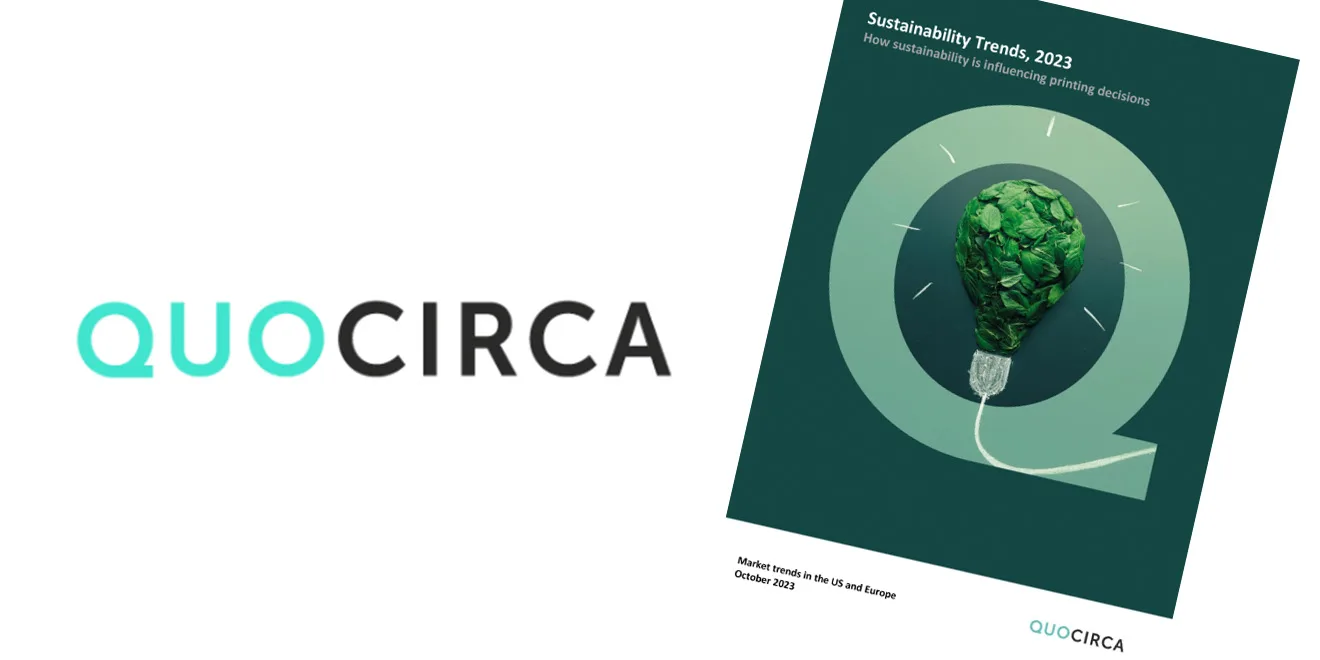More than three-quarters of organisations (77%) are accelerating their sustainability strategies in response to stakeholder demand and growing regulatory requirements.
There is growing urgency among companies to implement sustainability strategies and it is increasingly influencing print infrastructure buying decisions, finds Quocirca’s Sustainability Market Trends Study 2023. As a wider cohort of stakeholders in senior and mid-management exert greater influence over sustainability initiatives, buyers have high expectations of supplier and device performance.
Seven in ten decision makers say it is important that suppliers demonstrate that they are reducing their own environmental impact, and the same percentage say it is important their supplier provides a range of sustainable products and services. Notably, 69% of businesses say they formally track the environmental performance of their print supplier.
However, despite the rising focus on sustainability, decision-makers say a lack of data from vendors about the environmental impact of printers and MFPs is a barrier to achieving their corporate sustainability goals. Also, while 80% say they are willing to pay a premium for products with environmental features, the cost of such products is still cited among the top three challenges faced by organisations attempting to reduce their environmental impact.
Key findings also include:
- 46% say their sustainability goals influence their choice of supplier to a great extent, and a further 49% say sustainability influences choices to a moderate extent.
- 77% are accelerating their sustainability strategies, rising to 81% in Germany and 84% in the US.
- 62% say sustainability is important to business performance now, and 85% believe it will be important by 2025.
- Improving operational efficiency, saving money and meeting industry standards are the top three drivers for implementing sustainability initiatives.
- Sustainable consumables, device energy efficiency, and product longevity are the leading product selection criteria.
- Only 31% of organisations are extremely satisfied with sustainability information provided by suppliers.
Louella Fernandes, CEO, Quocirca, said: “A combination of stakeholder expectations and the implementation of legislation such as the corporate sustainability reporting directive (CSRD) are prompting organisations to speed up their sustainability initiatives. This is driving a broader cohort of decision-makers to put more emphasis on the sustainability performance of the solutions – and suppliers – they select. However, they are not always able to get the data they need from vendors. There is a clear need for vendors to offer more clarity around the sustainability credentials of their products; demand for relevant data and analysis will only increase in the future and vendors that can’t offer it will lose their competitive position.”
The study found that the most common strategies implemented to reduce environmental impact around the print infrastructure are focused on reducing paper consumption. The top three practices in place are adopting print policies to encourage responsible printing, adopting digital workflows (both in place for 44% of respondents), and using paper from certified sources (40%). Fewer companies are currently using remanufactured or refurbished hardware, or leveraging environmental analytics – these are in place at only 31% of businesses.
Companies view digitisation of paper-based processes as a central pillar of sustainability – 70% say it is important to achieving their objectives, second only to the adoption of a cloud platform, rated important by 75%.
Louella continues: “The pursuit of a less-paper workplace is nothing new, and limiting consumption through pull printing and process digitisation is a logical focus area. However, companies should explore the entire range of options for reducing the impact of the print infrastructure from cradle to grave. With many businesses embarking on significant investment in workplace technology to meet hybrid, distributed working requirements, now is a great time to modernise the print infrastructure with a view to meeting sustainability goals, as well as improving efficiency, security and reducing costs.”
While there is consensus around speeding up sustainability initiatives, companies are starting from different levels of maturity. Most organisations are still developing their strategies: 42% report they are just starting their sustainability strategy and a further 34% have several initiatives in place. Just 19% of organisations report they have a fully implemented company-wide sustainability strategy, dropping to 11% among SMBs and rising to 22% among large enterprises. The US is significantly ahead, with 35% indicating they have a company-wide sustainability strategy.
A company’s level of sustainability maturity is evident in its responsiveness to broader issues such as ESG legislation. The EU’s Corporate Sustainability Reporting Directive, for example, has impacted 60% of surveyed companies overall, but this figure rises to 86% among those that have fully implemented a sustainability strategy.
Louella concludes: “Whatever their level of sustainability maturity, companies should explore print infrastructure modernisation as a win-win for meeting sustainability goals. The industry has a long history of embedding circular economy principles into their value chain. Buyers can benefit from advances in technology and service provision that will help them meet energy efficiency, waste reduction, and wider environmental impact targets.”
Quocirca’s Sustainability Trends Study 2023 is available to purchase here, and a complimentary Executive Summary is also available for download.




















